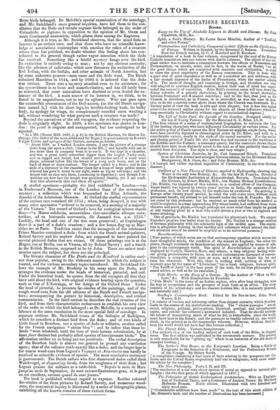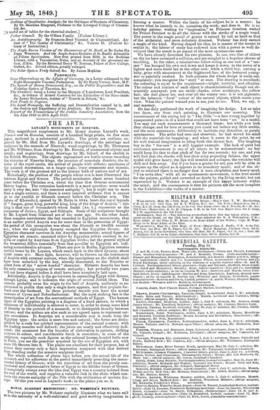PUBLICATIONS RECEIVED.
Booms.
Essay on the Use of Alcoholic Liquors in Health and Disease. By John Chadwick, M.D., &c., Sybil; a Soul's History. By James lanes Machin, Author of Trafford, and other Poems."
Protestantism and Catholicity Compared intheir Effects on the Civilization of Europe. Written in Spanish, by the Reverend J. Saimaa. Translated from the French version, by C. J. Hanford and R. Kershaw. [A translation of a book in four volumes, compressed by the zeal of its Roman Catholic translators into one volume with double columns. The object of the ginal author was to institute a comparison between the effects of Romaniam and Protestantism, on morals, order, and in fact, in the words of Burke, " on all the good things which are connected with manners and civilization," in order to show the great superiority of the Roman communion. This is done with a good deal of quiet impudence as well as of casuistical art and mildness' with a fair enough exposure of the faults of Protestants, when the matter admits of it. The mode of thought and reasoning is foreign, and therefore not very well adapted to convince English readers, unless their cast of mind has super- seded the necessity of conviction. John Ball's common sense will tear down the flimsy cobwebs of a priestly rhetorician, by pointing to the broad distinction between Protestant and Knnanist countries; and to the fact, that just as the Church is disbelieved, as in France, or is controlled, as was the case in Am- tria, so do the countries tower above those where the Church was dominant Ins literary point of view the book is able and even elegant; but it has this logicaj error—the reverend author claims for his church all those influences which be- long essentially to Christianity without regard to ecclesiastical dogmas.] The Life of Saint Paul, the Apostle of the Gentiles. Designed chiefly fur the use of Young Persons. By the Reverend G. E. Biber, LLD. [The first volume of a series of contemplated biographies, to embrace the lives of the leading characters who have influenced Christianity at various times. For the active period of Paul's career the New Testament supplies ample facts, which have been carefully digested in chronological order by Dr. Bihar, and told, to a considerable extent, nearly in the style of the sacred narrative. For the earlier and closing period of Paul's life the author has had recourse to the traditions of the Rabbins and the Fathers: a necessary quarry, but the materials drawn thence should have been more distinctly noted in the text as of less authority than those derived from Scripture. The style is clear, and very simple.]
System of Christian Doctrine by Dr. Carl Immanuel Nitzeh. Translated from the fifth revised and enlarged German edition, by the Reverend Robert Montgomery, MA. Oxon, &c.; and John Hennen M.D., &a.
[A learned and rather mystical exposition of Christianity, in the true German manner.]
Outlines of a New Theory of Disease, applied to Hydropathy, showing that Water is the only true Remedy, &a. By the late H. Franck° Director of the Ilydropathic Institution at Alexandersbad, Bavaria. Translated from
the German by Robert Blaikie, M.D., late Madras Medical Establishment. [Dr. Blaikie, the translator of this volume, is a medical officer of the Company, whose health was injured by twenty years' service in India, the anxieties of his profession, and, he now thinks, by the medicines he swallowed. Oa arriving in Europe after- twehty years' service, he tried the" cold-water cure, Without much permanent benefit, till advised to put himself under the late H. Francke. He was not cured by this professor; but he received as much relief from his method as could be expected ins man approaching fifty whose health had suffered from warm climates and much physic,—though perhaps not more relief than might be gained at any watering-place by a man who could devote a year or two to regimen and water-drinking.
Out of gratitude, Dr. Blaikie has translated his physician's book. We suspect Francke's practice was better than his theory. His Outline is a strange mixture of German philosophy with the scholastic logic of the middle ages. The exposi- tion is altogether wanting in that lucidity and coherence which attract the read- er's attention even if he should be sceptical as to an universal panacea.] Reverberations.
[Nine poems; of which seven are on that contemporary question which moves the most thoughtful minds, the condition of the masses in England; the other two pieces, though nominally on Scandinavian subjects, are applied by means of alle- gory to the contemporary world. The spirit of Reverberations is akin to that displayed by Carlyle, Maurice, Hare, and others; a deep religious feeling with- out giving predominance to forms, an almost contemptuous disregard of conven- tionalities, a sympathy with man as man, and a wish to better his lot and raise his character. With this there is nothing wild, nothing of what in mockery goes by the name of" Liberalism," but a loyal, religious, human spirit. "The Tenth' of April " is the best poem of the nine, for its tree philosophy and sound advice, as well as for its execution.] Cola Monti; or the Story of a Genius. By the Author of "How to Win Love," &c. With Illustrations by Franklin.
[" Cola Monti" is the name of an Italian orphan, who, after long struggles, wins his way to competence and the prospect of high fame as an artist. The stog consists of his school-days and his obscure London life: it is naturally planned, and naturally told.] Southey's Commonplace Book. Edited by his Son-in-law, John Wool Warier, B.D.
[A volume of curious and informing rather than elegant extracts, which Southey made in the course of his multifarious reading. The "choice passages" are on moral, religions, political, philosophical, historical, poetical, and miscellaneous topics, and exhibit the collector's unwearied industry. That he should undergo the labour of transcribing much of what he did, is remarkable, since the books must have been in his library, and the passages as readily referred to, one would think, in the printed as in the manuscript volumes. However, without that la- bour the world would not have had this curious collection.]
The Thumb Bible. Verbom Sempitenium. [The author's idea of the leading subject of each book of the Bible, in dogged verse. The first edition was published in the seventeenth century. The present is only remarkable for its "getting up," which is an imitation of the old mode of stamped binding.]
The Settler's New Home; or the Emigrant's Location. Being a Guide to Emigrants in the Selection of a Settlement, and the Preliminary Wails of the Voyage. By Sidney Smith.
[A compilation containing a vast mass of facts relating to the prospects our Co- lonies and the United States respectively hold out to emigrants, with some sensi- ble advice by the compiler.] The New Philosophy. Parts L IL and III.
[The conclusion of a not very clever system of moral as opposed to natural phi- [osophy; the two first parts of which appeared in 1847.] The Principles of Gothic Ecclesiastical Architecture. With an Explana- tion of Technical. Terms, and a Centenary of Ancient Terms. By Matthew Holbeche Bloxam. Ninth edition. Illustrated with two hundred and sixty wood-cuts. ["Considerable additions have been made" to the text of this ninth edition of Mr. Blaxam's book, and the number of illustrations has been increased.] • Outlines of Qualitative Analysis; for the Guidance of Students of Chemistry. By Dr. Sheridan bluspratt, Professor to the Liverpool College of Chemui- tin 8cm [A useful set of tables for the chemical student.]
Father Connell. By the O'Hara Family. (Parlour Library.) An Autobiorapt. By Francois-Rene Viscount de Chateaubriand, Au- thor of" fhe Genius of Christianity," &c. Volume IL (Parlour Li- brary of Instruction.) The Anglo-Saxon Version of the Efexameron of St. Basil, or Be Godes Six . Daga Weoreum. And the Anglo-Saxon Remains of St Basil's Admonitio ad Filium Spiritualem. Now first printed from MSS. in the Bodleian Library, with a Translation, Notes, and an Account of the presumed au- thor, /Citric. By the Reverend Henry W. Norman, Fellow of New College, Oxford, &c. Second edition, greatly enlarged.
The Solar System Truly Solved, &c. By James Hopkins.
PAMPHLETS.
Some Observations on the Affairs of Germany, in a Letter addressed to the Right Honourable Viscount Palmerston. By Sir Harry Verney, Bait., M.P. The Speech of Henry Drummond, Esq., on the Public Expenditure and the Existing System of Taxation, &c. The Crasser*: being a Letter to the Marquis of Lansdowne, Lord President, &c., in defence of Armed Coercion for the Extinction of the Slave-trade. By James Richardson, Author of" Travels in Sahara," &c. Free Trade in Negroes.
The Land Monopoly, the Suffering and Demoralization caused by it, and the Justice and Expediency of its Abolition. By Ebenezer Jones. Report of the Transactions of the Dublin Sanatory Association, from the 4th Jane 1848 to 30th April 1849.



























 Previous page
Previous page